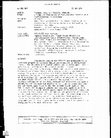Papers by Charles Teddlie
Journal of Educational Research, Nov 1, 1990
The Journal of Educational Research, 1990
Handbook of Psychology, Second Edition, 2012
The Delta Pi Epsilon Journal, 1987
Delta Pi Epsilon Journal, 1987
5 Context Issues within School Effectiveness Research Charles Teddlie, Sam Stringfield and David ... more 5 Context Issues within School Effectiveness Research Charles Teddlie, Sam Stringfield and David Reynolds Introduction For much of the history of SER, the varied contexts within which schooling occurs have been ignored. In fact, the lack of studies concerning the context of ...
Cambridge University Press eBooks, Jul 24, 2006
Cambridge University Press eBooks, Jul 24, 2006
Acknowledgments 1. Introduction 2. School level improvement efforts 3. District level reform effo... more Acknowledgments 1. Introduction 2. School level improvement efforts 3. District level reform efforts 4. Community level reform efforts 5. State level reform efforts 6. The role of reform design teams 7. The role of the Federal Government in reform efforts 8. Methodological issues in the study of systemic integration for effective reform 9. Discussion and conclusion Bibliography.
Journal of Mixed Methods Research, 2007
WITHDRAWN: Teddlie, C., & Yu, F. (2007). Mixed methods sampling: A typology with examples... more WITHDRAWN: Teddlie, C., & Yu, F. (2007). Mixed methods sampling: A typology with examples. Journal of Mixed Methods Research, 1(1), 77-100. DOI 10.1177/1558689806292430 Article withdrawn by publisher. Due to an administrative error, this article was accidentally published OnlineFirst and in Volume 1 Issue 1 of publishing year 2007 with different DOIs and different page numbers. The incorrect version of the article with DOI: 10.1177/2345678906292430 has been replaced with this correction notice. The correct and citable version of the article remains: Teddlie, C., & Yu, F. (2007). Mixed methods sampling: A typology with examples. Journal of Mixed Methods Research, 1(1), 77-100. DOI 10.1177/1558689806292430

Evaluation results for 1993-94 are presented for a Louisiana program to increase family participa... more Evaluation results for 1993-94 are presented for a Louisiana program to increase family participation in educational services for children with deaf-blindness and to coordinate services with federal initiatives. The program involves student identification, family training, infant and toddler direct services, technical assistance, transition planning se:vices, aria systems change. The program evaluation resulted in development of various objectives, including: (1) organize project resources, including st,ff training; (2) improve identification of eligible children who are deaf-blind; (3) utilize a computerized system to track and maintain information on children referred for evaluation and special education; (4) increase the ability of families to access services for the child, aged birth to 22, who is deaf-blind, and for the family unit; (5) integrate infants and toddlers, aged birth to 2, into community programs and/or assist agencies to provide transition services for this population; (6) improve the provision of services in the least restrictive setting, ensure that the curriculum results in functional outcomes, and utilize published "best practice'.;" standards to evaluate and revise intervention and educational programs; and (7) assist agencies to provide transition services for young adults with deaf-blindness. (SW)
Discusses the utility, design issues, inferences , logistics, and fundamental principles related ... more Discusses the utility, design issues, inferences , logistics, and fundamental principles related to mixed methods research; a related chapter by the same authors introduces this volume of 28 chapters on various methods of mixed methods research
Now that the school effectiveness field is maturing, more refined and contextually sensiLive obse... more Now that the school effectiveness field is maturing, more refined and contextually sensiLive observations about schools are possible. This paper focuses on socioeconomic status (SES) as one social context variable demonstrating substantial predictive poaer in numerous school improvement studies. Instead of viewing middle class *











Uploads
Papers by Charles Teddlie